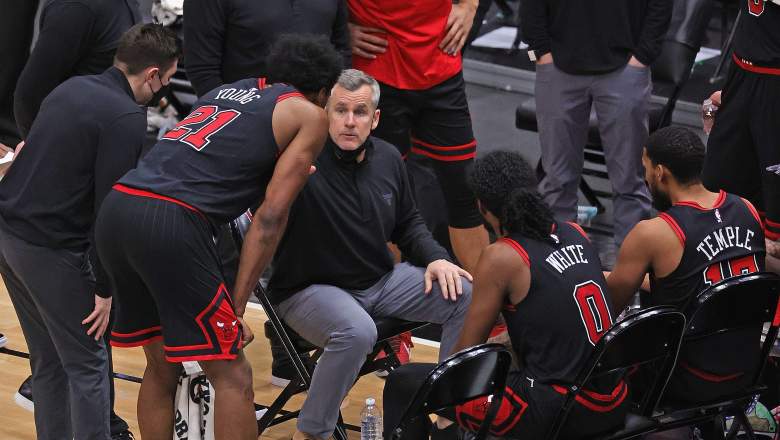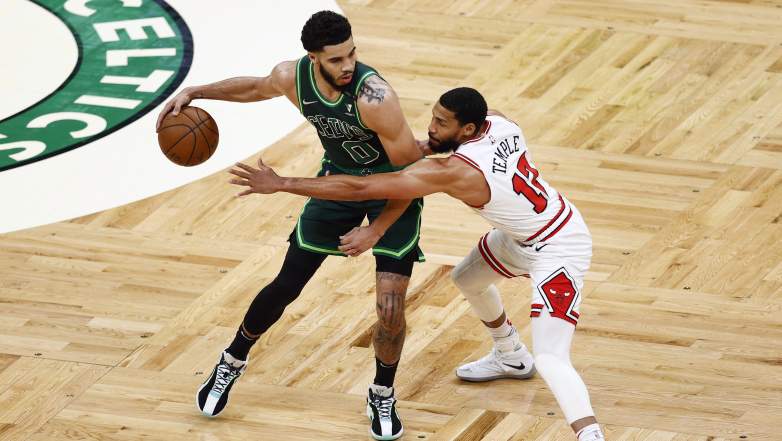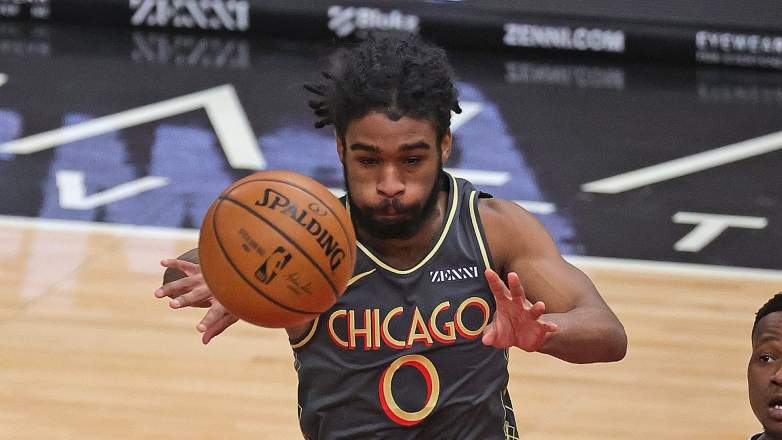
Getty Head coach Billy Donovan speaks with the team during a timeout on April 16.
When the Chicago Bulls acquired Nikola Vučević, excitement surrounded the franchise. While the Bulls gained other new players at the trade deadline, adding Vučević was the highlight. A fellow All-Star, he could complement Zach LaVine and provide a lethal two-man game that could potentially ensure a spot in the play-in tournament.
With a 6-11 record post trade-deadline, things don’t seem as though they’ve improved for the Bulls. They may have more talent, but that hasn’t necessarily translated into a better team. Granted, Chicago has been without LaVine for the last six games — during which the team has gone 3-3. But the Bulls’ struggles aren’t anything new.
From poor defense to turnovers, the problems that plagued the Bulls early in the season continue to be a concern. Signs of legitimate improvement have been scarce all season long, and it’s this failure to grow that continues to hinder the Bulls despite the high hopes their trade deadline moves brought.
The latest Bulls news straight to your inbox! Join the Heavy on Bulls newsletter here!
Defense Matters

GettyGarrett Temple guards Jayson Tatum in an April 19 game against the Boston Celtics.
The Bulls may not be the highest-scoring team, and they may have had a 12-point first quarter against the Cleveland Cavaliers last Wednesday. But scoring hasn’t been a legitimate concern for them, and it hasn’t been a key factor in the Bulls’ struggles this season. Stopping their opponents from scoring, on the other hand, is a different story.
Chicago scores 111.6 points per game. On average, the Bulls give up 112.8 total points and 49.8 points in the paint. While neither number makes them the worst defensive team in the league statistically, they are still toward the bottom of the defensive rankings at No. 19 and No. 27, respectively. Not to mention the Bulls are also allowing their opponents to shoot 47.6% from the field per game, which places them at No. 25 in the league. The number is nearly identical to the 47.5% opponent field goal percentage the Bulls are allowing in April.
When LaVine was announced to be out due to the league’s COVID-19 health and safety protocol, it was clear that the Bulls would need to step up in his absence. In the three wins they’ve recently achieved without their leading scorer, defense has played a significant role in the outcome. Chicago’s opponents scored no more than 96 points in each of those victories. In fact, every time the Bulls have held the opposing team to less than 100 points this season, they’ve won.
Following the win against the Boston Celtics on April 19, Garrett Temple acknowledged to reporters, including NBC Sports Chicago’s K.C. Johnson, the difference that defense had made for the team:
This recent focus on defense seemed to be the shift Chicago finally needed. But the Bulls have failed to maintain that consistency, reverting to their poor effort last Wednesday against the Cavaliers and in Saturday’s loss to the Miami Heat.
If this oscillating defensive effort were happening earlier in the season, then the Bulls would have a better chance at overcoming it. But they are fighting for a playoff spot, so the time for consistent steady play is now.
The loss to the Cavaliers took them out of the play-in tournament, so the Bulls already have to work their way back into it. But their chance at the playoffs also depends on other Eastern Conference teams contending for a play-in spot. If the Bulls fail to make defensive strides consistently, postseason NBA basketball will be foreign to Chicago for the fourth season in a row.
Turnover Troubles

GettyThe Chicago Bulls Coby White dishes a pass to the corner against the Charlotte Hornets.
Turnovers were a primary issue when the season started in December, and they continue to be a concern four months later as the regular season nears a close.
In the Bulls’ third game of the season, they lost a winnable game to the Golden State Warriors, 129-128. During the loss, they committed 24 turnovers — twice as many as the Warriors.
Following a 130-127 loss to the Los Angeles Clippers in January — during which the Bulls committed 22 turnovers in tandem with a 45-point showing from LaVine — Bulls.com noted head coach Billy Donovan’s acknowledgement of the continued turnover issue:
Obviously, the turnovers are a major, major factor and a major problem. We’re going to have to become a consistent team that takes care of the basketball, that defends without fouling and rebounds. If we can’t do those three things on a regular nightly basis it’s really, really hard to win. We’re going to have to do a better job of that.
Donovan’s comments remains true now.
At 15.5 turnovers per game, the Bulls’ average bests only the Oklahoma City Thunder. Furthermore, the Bulls allow 18.2 points off turnovers per game, so opponents are taking advantage of their mistakes.
Interestingly enough, Chicago’s turnover struggles have continued to remain high without LaVine — who leads the team in turnovers at 3.6 per game. In the past six games without him, the Bulls are still averaging 14.3 turnovers. Compared to the 17.7 turnovers the Bulls averaged in January, yes, they have done better at taking care of the ball. But it’s one thing to commit fewer turnovers, and it’s another thing for the decrease in turnovers to make a legitimate difference.
It also matters when the turnovers occur.
Take Saturday’s loss against the Miami Heat, for example.
The Bulls came back from a 24-point deficit to within 2 in the fourth quarter only to lose 106-101. Overall, Chicago committed 17 turnovers — 5 of which came during the first quarter and another 5 that happened in the fourth quarter. Ten of the Bulls’ turnovers came during crucial parts in the game, affecting how they started and finished.
While the high turnover number isn’t the sole reason for the Bulls’ latest defeat, it continues to prove the negative effect their inability to take care of the ball is having.
Should the Bulls keep turning the ball over at this high of a rate, their eyes will likely be set on the draft lottery instead of the play-in tournament.
READ NEXT: Cringeworthy Highlight Sums Up Career of Bulls Lottery Pick
Comments
Struggles With 2 Key Areas Continue to Set Bulls Back